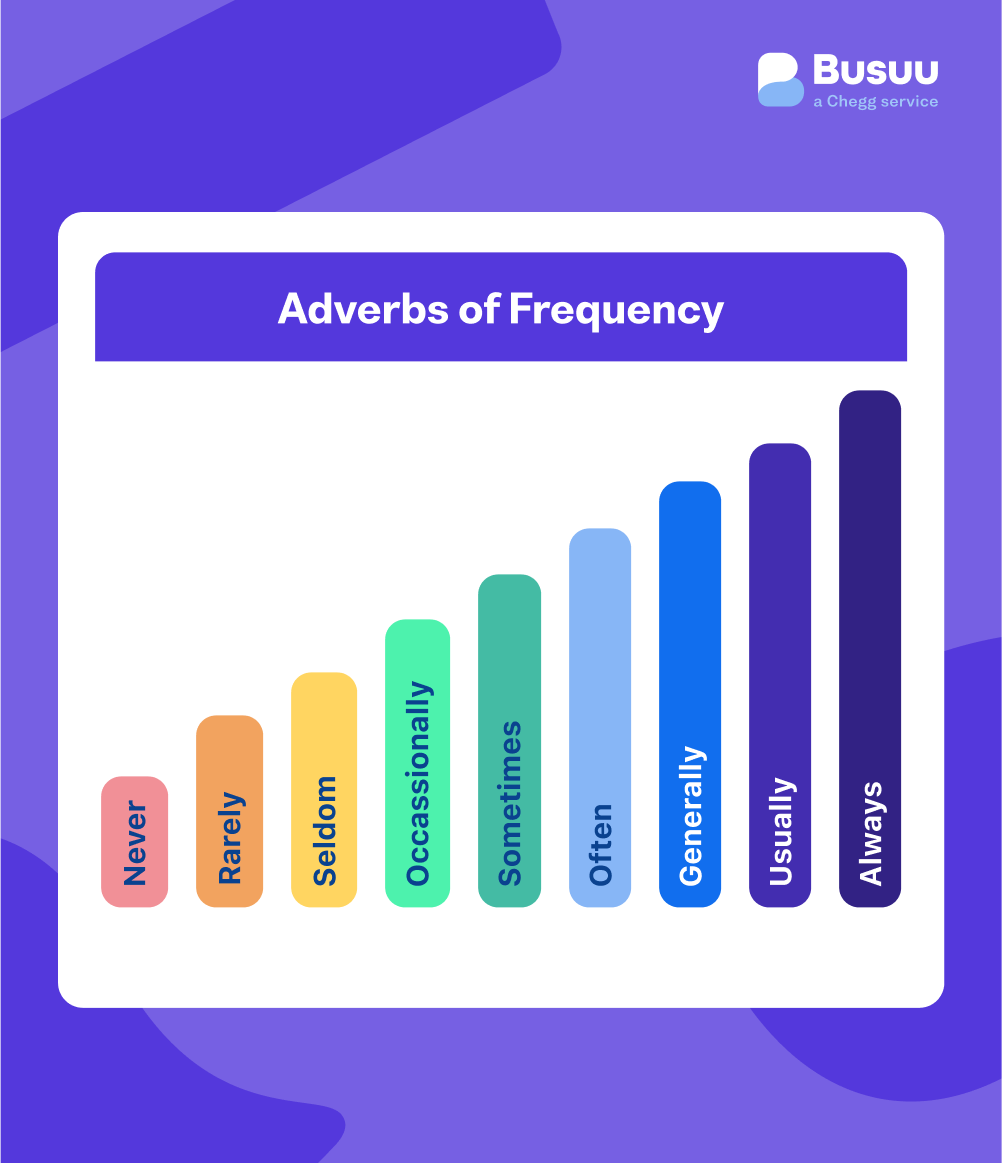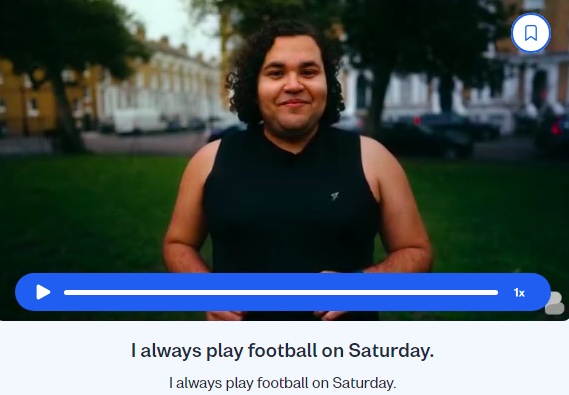A Guide to Adverbs of Frequency
Understand how to use adverbs of frequency and their role in positive sentences, negative sentences and questions.
I want to learn...
When describing your day-to-day life, you’ll need to express how often something happens. We do this with adverbs of frequency and whether you’re a beginner or you just need to brush up on your English, this article will help you understand all about them.
We are going to see how they work, where you should place them in a sentence, how to use negative adverbs, and how to ask questions about frequency.
Most common frequency adverbs
Remember, when studying vocabulary, learning words disconnected from one another is not really useful. It’s much better to imagine them in a context. Luckily for you, it is really easy to visualize frequency adverbs, so take a minute to focus on this table below to better remember these words in the future.

Percentage of usage: Adverbs of frequency
| Never | Rarely | Sometimes | Often | Usually | Always |
|---|---|---|---|---|---|
| 0% | 5% | 50% | 70% | 90% | 100% |
Let’s see a few examples of frequency adverbs in context:
- The public transport in this city is great! The bus is always on time.
- Today I was in a rush and I bought a coffee to go, but usually I have it at home.
- In spring, I often bike to work. I take the bus only when it’s raining.
- During the weekend I sometimes take a nap in the afternoon, especially if I was out until late the night before.
- I rarely eat fast food. I haven’t eaten any in two months, it’s bad for your health.
- He never forgets our anniversary, he always prepares something special.
This pretty much covers the basics of frequency adverbs but don’t rush it - there are still things to say about this topic. You see, in languages, it’s not only important to wonder about the meaning of a word but also to understand how it works in a sentence or in the communicative context.
When learning English, for example we should wonder: Where does this word needs to be in a sentence? How does it works in a negative sentence? And in a question? Keep reading to find out!
The position of adverbs in a sentence
There is one simple rule that you need to remember. Take a look at these examples and remember that the bold word is the frequency adverb, while the underlined word is the main verb.
Positions of frequency adverbs
| Main verb | Verb to be |
|---|---|
| I never go to the gym on Sundays. | I’m never tired on Sundays |
| Irarely go to the gym on Sundays. | I’m rarely tired on Sundays. |
| I often go to the gym on Sundays. | I’m often tired on Sundays. |
| I usually go to the gym on Sundays. | I’m usually tired on Sundays |
| I always go to the gym on Sundays. | I’m always tired on Sundays |
As you can see the rule is pretty simple. The adverb is before the main verb in a sentence, unless that verb is the verb “to be”. In that case the adverb is immediately after the verb.
Splitting verbs: Frequency adverbs and compound verbs
But wait a minute… What happens when we have a two word verb? Where will the adverb go in that case?
Compound verbs are those verbs formed by two words: an auxiliary like I am going, I have worked, I hadn’t thought. In this case the adverb will be positioned in the middle between the first part of the verb and the second part. Consider these examples where adverbs complement compound verbs:
- He’s always smiling to make people feel welcome.
- She’s usually driving home at this time.
- When I lived in New York I’d often go to Central Park to jog.
- I’ve rarely studied this much for an exam.
- I’ve never seen anything like this before.
Fun fact: Did you notice that there was a missing adverb in the examples provided above? This is because there is a special, very commonly used adverb that would not follow these rules strictly. Keep on reading to find out which one it was.
Sometimes, the wandering adverb
Here’s the culprit. The adverb sometimes likes to take a little walk in the sentence and you can find it in different positions.
Look at these examples:
- Sometimes he takes a different route to avoid traffic.
- He sometimes takes a different route to avoid traffic.
- He takes a different route to avoid the traffic, sometimes.
As you can see, sometimes can sit comfortably at the beginning of a sentence, right before the verb or at the very end. The general meaning of the sentence is pretty much the same but the different position might offer a little nuance to the conversation. Let’s see case by case.
When the adverb is at the beginning (Sometimes he takes a different route to avoid traffic) the adverb initiates the sentence setting the tone for the occasional deviation from the usual route.
When it’s mid-sentence (He sometimes takes a different route to avoid traffic) the adverb gracefully positions itself after the subject and before the main verb, creating a balance within the sentence.
A little different is when the adverb is at the very end of the sentence (He takes a different route to avoid the traffic, sometimes). In this placement the adverb adds a nuanced touch to the end of the sentence, suggesting a contemplative pause, rendered in writing by the comma.
Moving away from this cute wandering adverb and its many placements, let’s discuss the importance of precision in language, particularly when it comes to double negatives.
Never say ‘no’ twice: Avoid double negatives
Both in English and mathematics, two negatives make a positive statement. You should be aware of that when writing a sentence with never or rarely. These two adverbs in fact have a negative meaning and if we combine them with a negative verb, we will get a confusing and contradictory meaning.
If you say: I never didn’t go to Ireland. It seems like you haven’t missed a single chance to go to Ireland. So you went there.
The same with rarely. If you say: I rarely don’t eat meat. If your intention was to say that you are a careful flexitarian or someone that has a mostly plant-based diet, think again. A sentence structured like this will give the impression that you would eat as many hamburgers as you can.
In a sentence with never or rarely use a positive verb, like in these examples:
- I never went to Ireland.
- I rarely eat meat.
How to ask a question about frequency
To conclude, let’s take a quick look at how to ask a question about frequency.
If you are looking for a yes/no answer, the question is going pretty predictable.
- Do you come here often?
- Do you always park your car here?
- Have you never studied English before?
- Do you still talk to him sometimes?
On the other hand if you need to ask an open question, the right words are how often. This will let you ask how often or how rarely a specific action happens.
Let’s look at a few examples:
- How often do you go to the gym? – I never go, actually. I prefer to take long walks.
- How often do you take in the afternoon? – I always do it on the weekends.
- How often do you work from home? – Sometimes… like twice a week.
Wrapping up
We have seen the most common adverbs of frequency and we have understood their role in sentences, questions, and negatives. Whether you’re narrating your daily routine or ask for information, expressing action frequency is really important. Remember the correct position of adverbs in a sentence and to never have double negatives, and you're good to go!
You are never going to regret this…
Devoting a little of your time everyday to language learning can make a big difference. With clear explanations and fun exercises, Busuu will make your language learning adventure more exciting!. Sign up today and start learning English!

